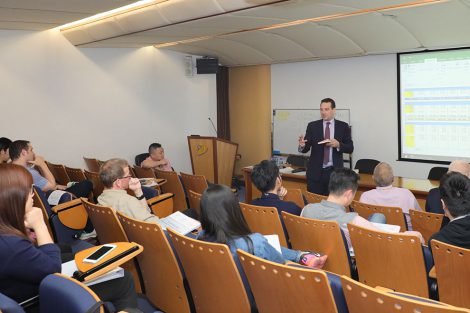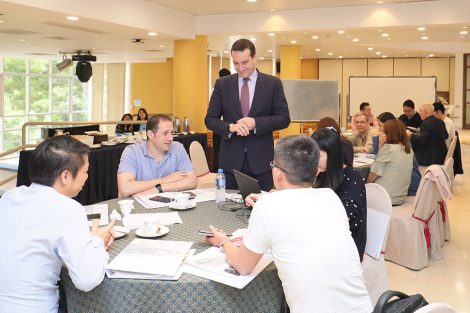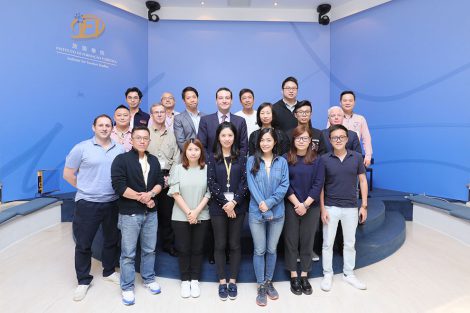IFT and the École hôtelière de Lausanne in Switzerland jointly arranged an executive development programme on “Food and Beverage: Successful Concepts and Durable Development”.
The programme was held at IFT on 10 and 11 April. Seventeen executives of hotels or integrated resorts attended.
The purpose of the programme was to offer people working in the hospitality industry training at an advanced level and to enhance the abilities of managers in Macao. The event focused on how to develop successful concepts for a food and beverage business, with an emphasis on technical planning and in making the most of back-of-house resources.
Lausanne Hospitality Consulting Senior Consultant Mr. Olivier Verschelde was in charge of the programme. Lausanne Hospitality Consulting is an arm of École hôtelière de Lausanne.
“It’s great to have an idea but it’s also important we know how to transform this idea into something that works, something that attracts clients,” Mr. Verschelde says.
Before joining Lausanne Hospitality Consulting, Mr. Verschelde was involved in managing a boutique hotel and spa project near Paris. He has helped set up food and beverage businesses at every stage from germinating the idea to starting operations. One such business was a restaurant that the Michelin Guide awarded its first star just 5 months after it opened.
Opening a food and beverage outlet is far from simple, Mr. Verschelde says. The process requires a lot of effort and has many stages, including picking a brand name, creating a logo, analysing the market, drawing up the menu, choosing the decor, recruiting staff, making financial projections and deciding on a marketing strategy.
“For instance, when we talk about design, we don’t only focus on furniture and the environment but also on the experience for customers,” he states.
Mr. Verschelde says all successful enterprises in the food and beverage business have a couple of elements in common: each can tell a story and each concentrates on remaining faithful to the concept of the food it serves.
People have needed to eat since mankind first walked the earth, but places to eat in the 21stcentury have to adapt to changes in the way people interact with food and with each other, he says. These changes include the competition for the attention of the diner offered by the ubiquitous mobile phone.
“We need to manage the atmosphere and entertainment within the restaurants through service, technology, music, lights and other elements,” Mr. Verschelde says. “We have become designers of wow effects, rather than just providers of cooks and waiters: that’s the future of long-term business success.”
Practical and useful
The Parisian Macao’s Director of Food and Beverage, Mr. Jovi Mak, was among the integrated resort managers that attended the executive development programme. Mr. Mak says attendees gained many insights into the food and beverage industry. He says Mr. Verschelde has extensive experience in developing concepts for restaurants that have an international appeal.
The executive development programme offered by IFT was also an opportunity to weave a strong network of industry figures and to discuss trends in the restaurant business in Macao, he adds.
Another of the executives from an integrated resort that attended the programme was Galaxy Macau Assistant Vice-President of Food and Beverage Operations Mr. Albert Lee. Mr. Lee says the programme was practical and useful. The emphasis the programme gave to the need for attention to detail during the planning stage was particularly illuminating.
“It helps to think about launching a food and beverage business using a systematic approach, from market research to concept development to design to operation to marketing,” he says.
Mr. Lee praises IFT for regularly holding special programmes for training Macao executives. “This type of course helps develop the skills of local professionals,” he says. “It helps us to refresh our knowledge.”
The Macao SAR Government has repeatedly stressed how important the unique gastronomic culture of the city is for the development of a sustainable tourism industry as Macao endeavours to become a draw for tourists and leisure-seekers from all over the world. Macao became part of the United Nations Educational, Scientific and Cultural Organization (UNESCO) Creative Cities Network in the field of gastronomy in November.











